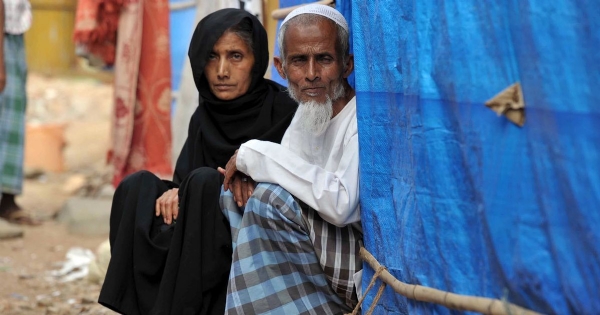Ahead of CAA amendment, Mumbai ATS arrests 2 Rohingya Muslims; Know why are they national threat to India
Moreover, the involvement of Rohingyas in Nuh violence, and latest Haldwani Violence is also an indication of their radicalisation, given that they sided with their religious counterparts against Hindus.
Total Views |
Taking the action against the Rohingya Muslims, Maharashtra's Anti-Terrorism Squad (ATS) has arrested two Bangaldeshi nationals while inspecting the Khidukpada village at Nadve in Panvel for residing in India without legal authorization.During an inspection of the locality, the ATS discovered the individuals living in a chawl, a type of row tenement.

Nationals Have Aadhaar, Voter ID Card In Their Names
What is more concerning it that, the police have recovered Fake an Aadhaar Card, Voter ID card and a Driving License from them. Upon questioning, the two men were unable to provide any valid documentation proving their legal entry into India.
This raised questions about how they obtained these Indian identification documents despite their illegal status. Recently it also came to light that Rohingya Muslims are using the Identities of deceased people in India to prove themselves as citizens of the country
Case Registered, Probe Initiated By Local PoliceSubsequently, a case was registered against them under the Passport (Entry into India) Rules-1950 and the Foreigners Act. Local police have launched an investigation to determine the extent of their activities and to uncover any connections to broader networks of illegal immigration.
-2 #Bangladesh nationals arrested by ATS Mumbai #Maharashtra for illegally living in #India
— Insightful Geopolitics (@InsightGL) February 12, 2024
-Had Adhar & Voter’s ID
-Can’t happen without connivance of officials
-3 such arrests in Dec’23 too
-Just imagine how many Chinese & Pakistanis could also be there to disrupt the nation pic.twitter.com/sJV7Mw72eo
In India, foreign nationals are required to have valid visas to stay in the country, with the maximum duration of stay on certain visas, such as e-Tourist visas or regular paper Tourist visas, capped at 180 days within a calendar year. Illegal migrants in India may face imprisonment or deportation under the Foreigners Act, 1946, and the Passport (Entry into India) Act, 1920, which empower the central government to regulate the entry, exit, and residence of foreigners.
If a foreign national is arrested in India, they must navigate the local legal process, which can include being charged, prosecuted, and possibly convicted. U.S. consular officers, for example, provide assistance to U.S. citizens arrested abroad.
The procedures for arresting a foreign national in India involve several steps, including recording information in writing, obtaining search authorizations, and ensuring the presence of a lady officer during searches involving females.
In 2020, the Anti Terrorism Squad (ATS) of the Maharashtra Police has busted a Bangladeshi illegal immigration racket and arrested eight people including four Bangladeshi nationals. The ATS managed to arrest a Mumbra-based agent who allegedly made fake passports for 85 Bangladesh nationals and facilitated their stay in the country.
Bangladeshi Rohingya Muslims are openly threatening Hindus and people of India
India has been deeply involved when it comes to rehabilitating and sheltering the battered ethnic group. Currently there are about 36,000 Rohingyas in India out of which only 9000 are officially registered. They remain concentrated in states like Uttar Pradesh, West Bengal, Andhra Pradesh, Kerala, Assam, Jammu and Kashmir and Delhi.
This happened in Mumbai when :
— Rishi Bagree (@rishibagree) January 28, 2022
Hamid Ansari was VP
Pratibha Patil was President
Congress Govt was in Maharashtra
Congress Govt was in Centre
Irony is that
They did this for Rohingya Muslims in Myanmar pic.twitter.com/bmtQ2WrNAy
India’s first major taste of the Rohingya crisis came, rather absurdly, on 12th August 2012 at Azad Maidan in Mumbai. A large crowd of Muslims assembled at the venue to protest against the Assam Riots and the Rakhine Riots in Myanmar, which were a confrontation between the Buddhists and Rohingya Muslims. The crowds soon turned violent which led to them vandalizing public property, molesting women cops, desecrating the Amar Jyoti Javan Memorial. The riots led to the death of two people.
Moreover, the involvement of Rohingyas in Nuh violence, and latest Haldwani Violence is also an indication of their radicalisation, given that they sided with their religious counterparts against Hindus. Several Rohingyas have been arrested in connection with the Nuh violence. It is being told that the police have registered more than 20 cases and arrested around 25 Rohingya refugees.
The Indian Government’s Stance on Rohingya
During discussions on the Citizenship Amendment Bill in 2019, the then Union Home Minister Amit Shah also mentioned Rohingya refugees. He stated that Rohingya refugees would never be accepted as citizens of India. According to him, Rohingya Muslims enter India through Bangladesh, but they would not be accepted. Shah clarified that there is no hatred towards Muslims and that the bill has nothing to do with the Indian Muslim citizens. Furthermore, the government has declared that illegal Rohingya Muslims pose a threat to national security. The government’s plan is to deport all illegal infiltrators back to their respective countries as part of national security measures.


